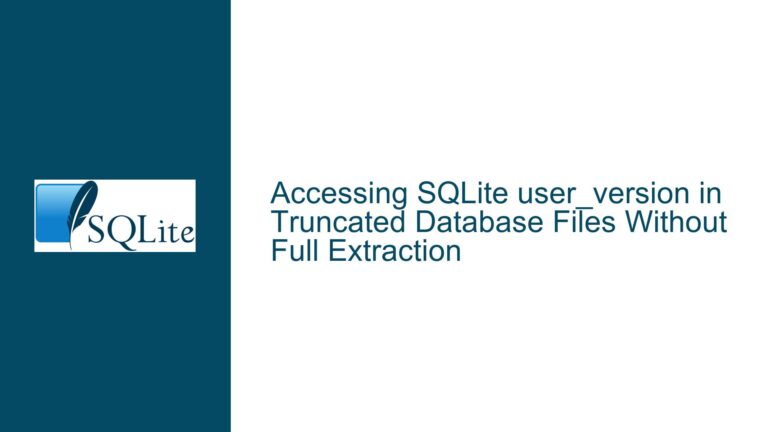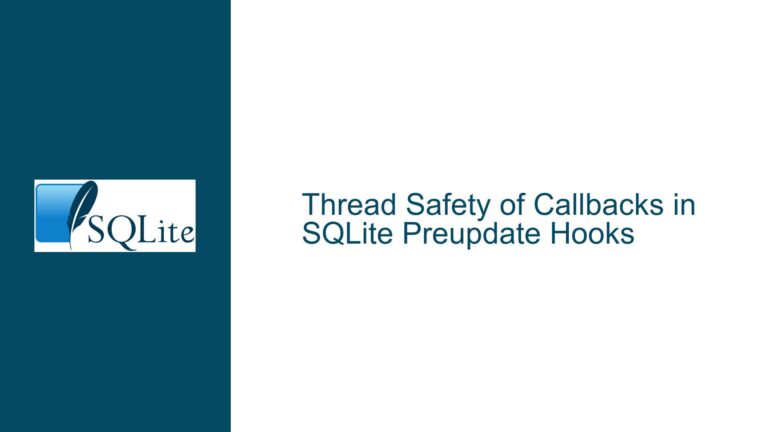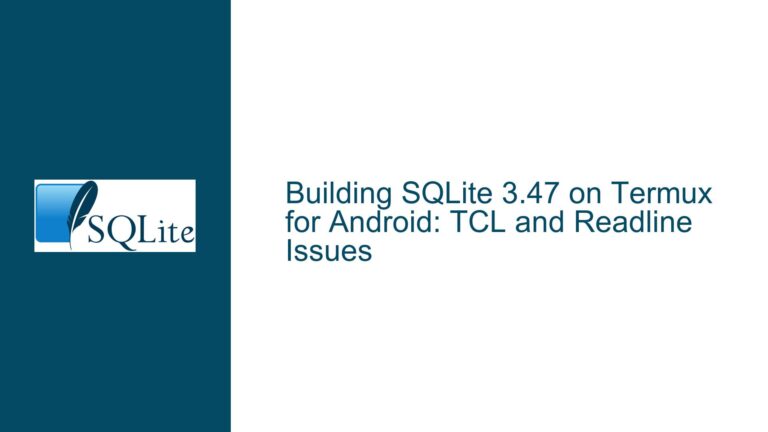PHP SQLite Insert Query Fails Due to Variable Scope Issue
SQLite Database Insert Query Fails in PHP Script
When working with SQLite databases in PHP, a common issue arises when attempting to execute an INSERT query within a PHP script. The query may work perfectly when executed directly in a SQLite browser or command-line interface, but fails when run through the PHP script. This discrepancy often stems from issues related to variable scope, database connection handling, and the proper use of the SQLite3 class in PHP.
In the provided scenario, the PHP script successfully opens the SQLite database and constructs an INSERT query dynamically. However, the query fails to execute within the PHP script, resulting in a fatal error: "Call to a member function exec() on null." This error indicates that the database connection object ($db) is not accessible within the function where the query is being executed. The issue is not with the SQLite database itself but with how the PHP script manages the database connection and variable scope.
Variable Scope and Database Connection Handling in PHP
The core issue lies in the scope of the $db variable, which represents the database connection. In PHP, variables have a specific scope, meaning they are only accessible within the context in which they are defined. When the $db variable is created in the main script, it is not automatically available within functions unless explicitly passed as a parameter.
In the provided script, the insertRecord function attempts to use the $db variable to execute the INSERT query. However, since $db is not passed to the function or declared as a global variable within the function, it is undefined (null) within that context. This leads to the fatal error when the script tries to call the exec method on a null object.
Additionally, the script closes the database connection within the insertRecord function. This is problematic because it terminates the connection after each insert, which is inefficient and unnecessary if multiple inserts are being performed. The database connection should remain open for the duration of the script or until all necessary operations are completed.
Properly Passing Database Connection and Handling Scope
To resolve the issue, the database connection object ($db) must be passed to the insertRecord function as a parameter. This ensures that the function has access to the active database connection and can execute the query successfully. Furthermore, the database connection should not be closed within the function unless explicitly required.
Here is the corrected version of the script:
class MyDB extends SQLite3 {
function __construct() {
global $database;
$this->open($database); // optumRx.db
}
}
$db = new MyDB();
if(!$db) {
echo $db->lastErrorMsg();
} else {
echo "Opened database successfully";
}
$str2 = " VALUES( ";
$str2 .= "'".$recArray['Cost'][$i]."',";
$str2 .= "'".$recArray['ReFills'][$i]."');";
$query = $str.$str2;
fwrite($fh, $query."\n\n"); // write query to log
fwrite($fh, "\n ========================================================\n\n");
insertRecord($db, $query); // pass $db as a parameter
$str2 = " VALUES( "; // begin next record
function insertRecord($db, $sql) {
echo $sql; // for testing purposes only
$ret = $db->exec($sql);
if(!$ret) {
echo $db->lastErrorMsg();
} else {
echo "Records created successfully\n";
}
// Do not close the database connection here
}
In this corrected script, the insertRecord function now accepts two parameters: the database connection object ($db) and the SQL query ($sql). This ensures that the function has access to the database connection and can execute the query without encountering a null object error.
Additionally, the database connection is no longer closed within the insertRecord function. This allows the connection to remain open for subsequent operations, improving the efficiency of the script. If the connection needs to be closed, it should be done after all database operations are completed, typically at the end of the script.
Best Practices for SQLite Database Operations in PHP
When working with SQLite databases in PHP, it is essential to follow best practices to avoid common pitfalls and ensure efficient and reliable database operations. Here are some key considerations:
1. Proper Variable Scope Management
Ensure that all variables, especially database connection objects, are properly scoped and accessible where needed. Pass variables as parameters to functions or use global variables judiciously to avoid scope-related issues.
2. Efficient Database Connection Handling
Open the database connection once at the beginning of the script and close it at the end, rather than opening and closing it repeatedly within functions. This reduces overhead and improves performance.
3. Error Handling and Debugging
Implement robust error handling to catch and diagnose issues quickly. Use try-catch blocks for exception handling and log errors to a file or output them for debugging purposes.
4. SQL Injection Prevention
Always sanitize and validate user inputs to prevent SQL injection attacks. Use prepared statements and parameterized queries to securely execute SQL commands.
5. Database Backup and Maintenance
Regularly back up the SQLite database to prevent data loss. Use SQLite’s built-in tools or custom scripts to automate backups and perform routine maintenance tasks.
6. Testing and Validation
Test SQL queries directly in a SQLite browser or command-line interface before integrating them into PHP scripts. This helps identify and resolve issues with the queries themselves before they are executed in the script.
7. Documentation and Code Organization
Document the code thoroughly, including comments and inline documentation, to make it easier to understand and maintain. Organize the code into logical sections and functions to improve readability and reusability.
By following these best practices, developers can avoid common issues and ensure that their PHP scripts interact with SQLite databases efficiently and reliably. Proper variable scope management, efficient database connection handling, and robust error handling are particularly critical for preventing the type of issue described in this scenario.
Conclusion
The failure of an SQLite INSERT query in a PHP script is often due to variable scope issues and improper handling of the database connection. By ensuring that the database connection object is properly passed to functions and managing the connection efficiently, developers can avoid common pitfalls and ensure successful database operations. Following best practices for SQLite database operations in PHP further enhances the reliability and performance of the script.






